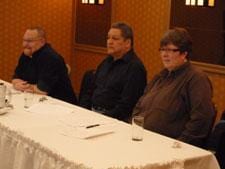A group of six Canadian queers is taking on homophobia in Canada’s healthcare system by filing a complaint with the Canadian Human Rights Commission.
“The constitution of this country guarantees equality to all Canadians in all areas but that still does not hold for gay, lesbian, bisexual Canadians when it comes to our health,” said Gens Hellquist, one of the complainants and executive director of the Canadian Rainbow Health Coalition, at a press conference in Toronto on Feb 17.
“We’re tired of watching many senseless premature deaths in our community that result from homophobia while government health agencies sit on the sidelines. It’s time both agencies live up to their missions and visions when it comes to gay, lesbian, bisexual Canadians.”
Hellquist, along with fellow complainants Art Zoccole of Toronto and Sheri McConnell of St John’s, were on hand for the press conference. The other complainants are Vancouver’s Phillip Banks, Saskatoon’s Charlotte Rochon and Montreal’s Daniel Lanouette.
The complaint, presented as a 10-page document, charges that the government agencies are ignoring queer health issues that have been brought to their attention through multiple, government-funded reports.
“Over the past 10 years [Health Canada and the Public Health Agency of Canada] have contracted with experts on gay, lesbian, bisexual health to produce studies on the many health issues that are endemic to our community and ask for recommendations how to address those issues,” said Hellquist. “To date none of those reports have been acted on and none of the numerous recommendations have been acted upon.
“Health Canada and the Public Health Agency of Canada have developed policies, strategies and funding initiatives for most other populations in this country but they seem unwilling to do the same for gay, lesbian, bisexual Canadians even though we have one of the poorest health statuses in this country.”
The report’s list of health issues affecting queer Canadians includes lower life expectancy than the average Canadian, suicide, higher rates of substance abuse, depression, inadequate access to care and HIV/AIDS.
“There are all kinds of health issues that are endemic to our community,” said Hellquist. “We have higher rates of anal cancer in the gay male community, lesbians have higher rates of breast cancer. These are all issues that need to be addressed.”
However no specific objectives are laid out in the document. “This complaint is really about social policy and about funding strategies and very much as a broader social policy level, rather than at the frontline interactive level because the responsibilities of Health Canada exist at a social policy level,” said McConnell.
Hellquist said the complaint is just the first step in increasing the pressure on the healthcare agencies to address queer issues.
“This is a starting point, to get attention because we haven’t got attention other ways,” he said. “Quite frankly this isn’t likely to be our last step.”
To date the Canadian Rainbow Health Coalition’s attempts to advance queer health concerns with Health Canada and the Public Health Agency of Canada haven’t been taken seriously, Hellquist told the press conference.
“We’ve made numerous attempts to meet with health ministers and had no luck,” he said. “They set up meetings with other bureaucrats within the department who make all kinds of promises to us, none of which they carry out…. We’ve made numerous attempts to make some changes to develop a partnership with the department and every indication is that they’re not interested. Needless to say we’re frustrated.”
In the meantime Hellquist charges that the healthcare system has been equating gay health with HIV/AIDS. “When Health Canada or anyone talks about health issues in the gay/lesbian/bisexual communities they’re talking about HIV/AIDS and the reality is there is more GLBT people in this country who die of suicide each year than die from AIDS, there are more who die early deaths from substance abuse than die of HIV/AIDS.”
The human rights complaint isn’t just about getting the attention of the government and the healthcare system.
“We want other gay and lesbian and bisexual Canadians to write letters to their members of Parliament, to do something, not just to leave it up to us six who have made this complaint but get behind us and join us in this new battle that we’re starting,” said Zoccole.
“This is as much a call to our community to get active on this issue,” said Hellquist. “We’ve become complacent over the last decade or so…. When HIV/AIDS first appeared and was ignored by our healthcare system we took action. We marched, we did die-ins, we were loud and vocal about it. I think we’ve become very complacent.
“It seems that… now that we can get married everyone assumes that we don’t have any issues any more. A lot of the deaths that occur in our community are hidden, we don’t see them. Those of us who are working on the front lines see them and I’m tired of watching my community die.”

 Why you can trust Xtra
Why you can trust Xtra


